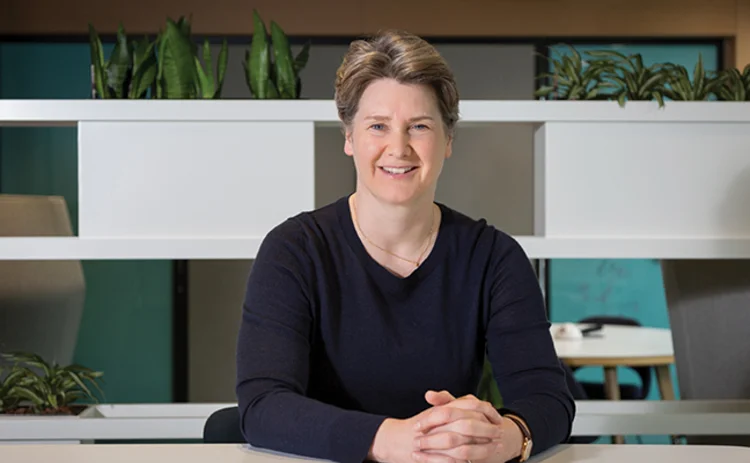A Serendipitous Journey: Elly Hardwick, Deutsche Bank
Deutsche Bank's Elly Hardwick discusses her career and how the bank is looking to roll out innovative new solutions to tackle old problems.

Before we even get a chance to engage in some customary small talk at the start of our interview, Elly Hardwick, head of innovation at Deutsche Bank in London, has a confession: “I am not a technologist—my story is one of serendipity,” she admits. “My degree is in oriental languages—specifically Indian languages, although don’t ask me to speak any—which you might not think is the best training for this job.”
Indeed, studying Hindi and Tamil—even if it was at Cambridge University—is hardly orthodox preparation for a life in capital markets technology, but as Hardwick explains, hers was a serendipitous journey, kicked off by her first post-varsity move to the UK’s civil service, of all places. “That was my first tech role,” she says. “I was on the European Fast Stream program, which at the time trained British officials for a career in European institutions. One of the rotations I did while I was there was in the communication and information industries. That was right at the beginning when the government had just discovered the internet and I, like most ‘Fast Streamers’ in those days, was given amazing levels of responsibility to think about things like domain naming and illegal content on the internet.”
Hardwick was involved in the Internet Watch Foundation—“one of the first responses to what to do about illegal content posted on the internet, and which is now hugely topical,” she explains—in addition to working on the approval of the design of the first digital television set-top boxes in the UK. “That was my introduction to the business aspects of technology and that has always been my focus—not so much the technology per se, but its business application in the real world.”
After her stint in the civil service, Hardwick moved to Booz Allen Hamilton, a telecommunications, media and technology consultancy where she focused mostly on media. “As a non-technologist, I have followed a lot of the business applications of technology,” she says. “In hindsight, it looks beautifully well planned, but it was serendipitous at the time.”
Back to Cambridge
The first hint that Hardwick was destined for a career in the capital markets came by way of a two-year stint at the other great university based in Cambridge—this one, Harvard University, being based in Massachusetts, where she earned an MBA. “I had always taken the view that if anyone wants to have a global career in finance or industry, you have to understand the US,” she says. “I did a two-year MBA from 2000 to 2002 at Harvard and deliberately chose to go to the US because as a European, you have to have that perspective. It was an absolute eye-opener for me in terms of how Europe is perceived and the sheer scale of the economies.”
Hardwick returned to the UK, MBA in hand, and made the transition to the capital markets by joining Morgan Stanley in Cabot Square, Canary Wharf. At the time, she remembers Canary Wharf “wasn’t even a building site,” given that One Canada Square, the 50-story, pyramid-topped, post-modernist monolith now synonymous with the commercial district, had only been standing for just over a decade, while much of the remaining vicinity of the West India Docks was still in the grip of industrial decay after the port fell silent in the early 1980s. “I was in equity sales, which I think was very useful both in terms of my credibility with people at the bank—I walked in their shoes and knew what they were talking about—and also in terms of understanding how the capital markets work.”
After her three-year stay at Morgan Stanley, Hardwick joined Thomson Financial in 2006 (which became Thomson Reuters in mid-2008) for a total of six years, where she served in a range of strategy roles and also headed up the firm’s Professional Publishing division, which owned IFR, Private Equity Week, and Venture Capital Journal.
But it was her next move that proved pivotal in her career, combining technology, the capital markets and establishing a startup in one fell swoop: She helped co-found CreditBenchmark in 2012, a business that is still going strong today and of which Hardwick is a shareholder. “I was tempted away [from Thomson Reuters] by a former Thomson Financial boss of mine, Donal Smith, to look into the concept of credit ratings, which was the genesis of CreditBenchmark and which I became CEO of,” she explains. “The thesis was this: We’ve had a financial crisis, it was widely believed that the credit rating agencies had played a role [in the crisis] in that they hadn’t forewarned people about credit issues, and despite that, there hadn’t been a successful challenger in that space. We wanted to think about why we had a $6 billion industry dominated by three large incumbents, but no challengers. It should have been ripe for disruption and yet it wasn’t happening.”
CreditBenchmark’s strategy largely mimicked that of Mark-it Partners (now IHS Markit) in its early years when the firm, led by ex-TD Securities head of Europe and Asia, Lance Uggla, established a credit default swap (CDS) pricing service based on banks’ own CDS pricing data, which they submitted to Mark-it and which it then blended and benchmarked overnight and sold back to them the following morning. It was an innovative solution to a vexing problem facing large numbers of credit market participants, which also turned out to be stunningly successful and lucrative.
“The approach we came up with was to go to the banks that have mini-rating agencies within them by virtue of their credit analysts numbering between, say, 20 and a couple of hundred, who produce internal credit-risk ratings for their own reg-cap calculations,” Hardwick explains. “That data had been kept confidential because it is a differentiator for them when it comes to lending and making credit-risk decisions. Our pitch [to the banks] was that if they would share that data with us, we could pull it all together, match up the entities that they had rated, and provide them with a consensus. The challenge for us was to convince the banks to share their data with a startup that had never been shared before. That gave me a very good grounding in the hygiene factors of running a company.”
Joining Deutsche
Four years after starting CreditBenchmark, Hardwick was on the move again, this time to Deutsche Bank, which she joined in December 2016 as its head of innovation, a role she and JP Rangaswami, Deutsche’s chief data officer and group head of innovation, had been mulling for some time. What attracted her to the business, she says, was that she felt that Deutsche was open to the concept of innovation across its various business units, and that what it was looking to do was practical and that it leveraged her CreditBenchmark experience.
“Deutsche wanted to make it easier for startups to do business with the bank and by that I mean sell things to us,” she says, intimating why Deutsche had considered her to be the ideal candidate to lead its innovation drive. “I had spent the past five years trying to get banks to become customers, so I had an intimate understanding of what works, what is more challenging, and what could be fairly easily tweaked to make life easier for everyone.”
The bank’s innovation function, established by former COO Kim Hammonds, who stepped down from her role on May 24 this year by mutual agreement with the board, has three objectives: outside-in technology transfer, ensuring that the business has access to technology from the outside ecosystem that it otherwise wouldn’t have encountered; cultural transformation, which Hardwick by her own admission was “pretty skeptical of,” but has since come to realize that it’s “one of the most powerful levers” the bank has in terms of driving change; and supporting the bank’s digital strategy.
How Hardwick and her team go about achieving those three objectives centers primarily on the technology transfer piece by way of a series of global innovation labs—two in the US (New York and Silicon Valley), two in Europe (London and Berlin), and one in Singapore, which the bank will open this year. “Our pitch to the business—and I view the business and supporting functions within Deutsche Bank as my customer—as to why we should have these labs, is that we will bring them the best solutions globally, rather than, for example, a lab in Frankfurt talking to the business in Frankfurt and bringing them a Frankfurt-based startup,” she says. “That’s kind of pointless.”
Lean
According to Hardwick, the labs are “emphatically demand-driven” in terms of what they focus on. What they don’t do, however, is identify a technology theme—quantum computing, for example—establish a team, provide it with some money, and ask it report back in a few years when it has some results. That, she maintains, is not a pathway to new technology adoption.
Eric Ries, the developer of the Lean Startup methodology, advises startup principals to “get out of the office,” much along the lines of Genba, the Japanese word for “the actual place” which, when used in a lean manufacturing context (upon which Ries’ methodology is loosely based), focuses on the importance of time, productivity and space. One of Lean’s central tenets is the importance for a startup to establish what its target market wants and then solve those problems rather than developing products based on what it assumes the market might want and attempting to shape the problem to fit the solution. That, he contends, is one of the primary reasons why so many startups fail. “That is exactly what we do,” Hardwick, explains. “When I say we are demand-led, I am careful that we position ourselves as extremely business-like and practical with our customers, the bank.”
Hardwick’s team typically works with each business or support function within the bank—legal, risk, or sales and trading, for example—and has a group of people who come together regularly that includes the coverage leads from the labs, a senior person from the business, a senior representative from the CIO’s office, some technologists and some ops people, where they discuss the bank’s demand challenges. The innovation team then matches up those demands with what it is seeing in the market and develops a prioritized list of demands.
“We’ll go out and look at who is active in the space and who is getting traction—a little bit like a VC would,” Hardwick explains. “We’ll then do the boiling-down process to find out which of all those firms not only has a product doing well in the market, but which one has a solution that fits the reality of Deutsche Bank, because we have geographic specificities, we have regulatory specificities and everyone has specificities about their technology stacks and their data. So we need a recommendation that will work [for] Deutsche Bank. That is my currency for the business—I bring them stuff that will help them, and it will help them now.”
Technology
In terms of the technologies Hardwick has her eye on at present, it’ll come as no surprise to Waters’ readers that artificial intelligence—encompassing robotic-process automation, machine learning, natural-language processing and smart-documentation automation—which, she says, is so ubiquitous that it has almost become its own horizontal, is one of two that top that list, while distributed-ledger technology (DLT) is the other. “As an institution, we’re fairly bullish about DLT,” she says. “There are a number of initiatives with pilots in development. One example is a consortium called we.trade, a trade finance blockchain initiative. But the point is not that it’s blockchain—the point is that there’s a business application that happens to be particularly well supported by DLT.”
Hardwick anticipates seeing a number of in-production instances of distributed ledger and blockchain-type initiatives at Deutsche this year, while another initiative the bank is participating in is the Utility Settlement Coin, a form of digital cash designed to clear and settle financial transactions, underpinned by blockchain and expected to launch this year.
Cultural transformation is also part of Hardwick’s remit, which she says provides the type of “leverage” within the firm in a way that it could never get from other types of initiatives. “It enables us to reach a far larger number of people across the bank—bear in mind that Deutsche has 97,000 employees. For us to really change the direction of the ship, we have to deliver significant leverage to those people, and cultural transformation initiatives are one of the most powerful ways of doing that.”
Changes
Given that Hardwick has now been in the role for 18 months, what has she learned along the way? Is there anything she is doing differently now that she has her feet under the table? “Yes,” she responds. “I have learned about the absolute importance of every conversation we have with my customer—the business—and the importance of having a ‘triumvirate’ at the table: the business, tech and ops, and innovation. The quality of that relationship is a great indicator of whether things are going to land and stick.”
Hardwick explains that during her first career in the capital markets, the producers were the kings and queens of the business. For example, she says, if a senior trader wanted something, they would dictate the strategy and they would get what they wanted or else “things started flying around the room.” In those days, technology was seen as a service beholden to what the senior producers wanted. “If there is one way that technology advancements have changed things it is that that dynamic doesn’t work anymore,” she says. “Where things work is where business and technology are at the table together, setting a common strategy where they understand the other’s contribution.”
A universal truth about journeys is that serendipity often ends up playing a role. And as Hardwick’s meandering route to Deutsche Bank suggests, the most satisfying journeys are those where the destination turns out to be a place that you never knew you wanted to visit … until you got there.
Only users who have a paid subscription or are part of a corporate subscription are able to print or copy content.
To access these options, along with all other subscription benefits, please contact info@waterstechnology.com or view our subscription options here: http://subscriptions.waterstechnology.com/subscribe
You are currently unable to print this content. Please contact info@waterstechnology.com to find out more.
You are currently unable to copy this content. Please contact info@waterstechnology.com to find out more.
Copyright Infopro Digital Limited. All rights reserved.
As outlined in our terms and conditions, https://www.infopro-digital.com/terms-and-conditions/subscriptions/ (point 2.4), printing is limited to a single copy.
If you would like to purchase additional rights please email info@waterstechnology.com
Copyright Infopro Digital Limited. All rights reserved.
You may share this content using our article tools. As outlined in our terms and conditions, https://www.infopro-digital.com/terms-and-conditions/subscriptions/ (clause 2.4), an Authorised User may only make one copy of the materials for their own personal use. You must also comply with the restrictions in clause 2.5.
If you would like to purchase additional rights please email info@waterstechnology.com
More on Emerging Technologies
Asset manager Saratoga uses AI to accelerate Ridgeline rollout
The tech provider’s AI assistant helps clients summarize research, client interactions, report generation, as well as interact with the Ridgeline platform.
LSEG rolls out AI-driven collaboration tool, preps Excel tie-in
Nej D’Jelal tells WatersTechnology that the rollout took longer than expected, but more is to come in 2025.
The Waters Cooler: ’Tis the Season!
Everyone is burned out and tired and wants to just chillax in the warm watching some Securities and Exchange Commission videos on YouTube. No? Just me?
It’s just semantics: The web standard that could replace the identifiers you love to hate
Data ontologists say that the IRI, a cousin of the humble URL, could put the various wars over identity resolution to bed—for good.
T. Rowe Price’s Tasitsiomi on the pitfalls of data and the allures of AI
The asset manager’s head of AI and investments data science gets candid on the hype around generative AI and data transparency.
As vulnerability patching gets overwhelming, it’s no-code’s time to shine
Waters Wrap: A large US bank is going all in on a no-code provider in an effort to move away from its Java stack. The bank’s CIO tells Anthony they expect more CIOs to follow this dev movement.
J&J debuts AI data contracts management tool
J&J’s new GARD service will use AI to help data pros query data contracts and license agreements.
An AI-first approach to model risk management
Firms must define their AI risk appetite before trying to manage or model it, says Christophe Rougeaux








